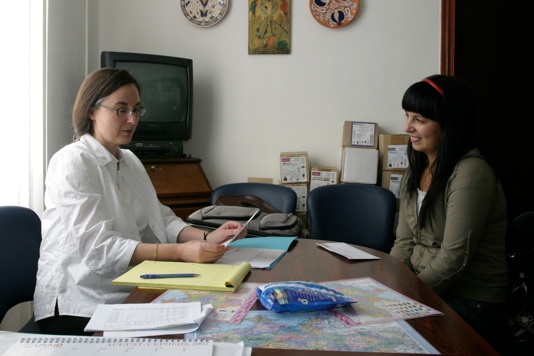2007

Once I returned to Kyiv after my sojourn in L'viv, it was mostly work and little play. Irka, Peggy and Nellie had flown in from the States, and there was a lot of UCARE work to be done. Peggy and I spent Saturday and Sunday interviewing scholarship students, while Irka and Nellie got to work on Route prep, sorting through the items that had been both shipped ahead1 and brought with them, as well as purchasing2 and collecting3 additional items in Kyiv4.
Peggy is in charge of our scholarship program, and wants to meet with each recipient at least once during their time with us. The program doesn't provide actual scholarships to the participants; the Ukrainian government covers the tuition costs of any children from the internaty, and gives them a small stipend. A very small stipend. Most cannot afford to go to school, as there aren't any real work study programs, and books and living expenses aren't covered. That is where our program helps out. Donors in the USA provide $1000 for their student; this is administered by the Kyiv office, which provides a set monthly stipend, and budgets the rest of the money for clothing, books, food, medical and dental costs, etc. Each budget is supposed to be customized for the particular student's needs. The office provides access to legal and psychological counseling if needed. And, just as importantly, the office provides these kids a sort of home and family. Many come and visit on a regular basis, and call frequently with problems, or just to hear a friendly voice. Tanya, our UCARE representative in Ukraine, gets to know them all, and becomes almost like a mother to many.
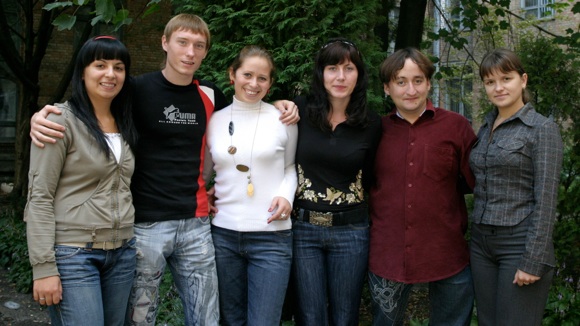
Some of the students interviewed in fall of 2007
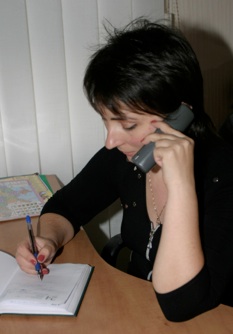
Most of the students were hesitant, if not scared, at first. Their dealings with "authority" have not, apparently, always been pleasant, and they weren't sure what to expect. We tried to put them at ease, explaining that we were there to try and help them, not to investigate them. Several of the "new" students were old friends of mine from the camps, including Vitya from Tsyurupinsk, and Tolyik from Poltava, both of whom had been camp presidents. We chatted, Peggy took copious notes, and I took lots of photos.
Others helped as well. Ruslan (below), who has long since graduated from university and is working in the field of management, came and helped the students set up e-mail accounts, so they could better communicate with the office and with their sponsors.
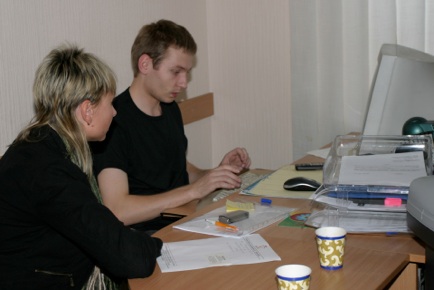
Ruslan, one of our volunteers, helps Tetyana set up her first e-mail account
Most of the kids were smiling with us by the end. As Peggy noted in her trip report:
"The students seemed to enjoy not only the gifts, but the special attention each received. Some of the students also brought little gifts or photographs for their sponsors. The sponsors have told us in the past that they really enjoy the reports and photographs of the students which they receive as a result of these meetings. We believe this is an important way to show sponsors how much their money and support is valued and what tremendous good the sponsors do in the lives of these beautiful young people. "
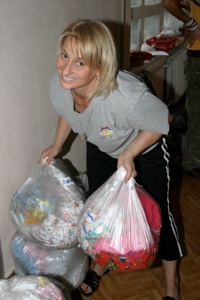
The RFI strategy worked well. We had shipped needed items, and bought only those we had to in Kyiv. This meant we would not need to take as much with us. The RFI also gave us some background information on the sites in advance. By the time we hit the road, we filled a very large van to capacity. After some initial doubts about whether we had over-loaded the van, we finally pulled out of Kyiv, with groaning shock absorbers. We didn’t have room for some of the other things we had wanted to purchase in Kyiv, so we made plans to purchase them in larger cities along our route, which, in retrospect, we found to be a good general strategy6.
Main UKRAINE Page
___________
-
1.We shipped some limited items from the U.S., including 2,000 toothbrushes, dental floss, Crayola crayons, soccer and volleyballs, air pumps, assorted toys, notebooks, glue sticks, yarn and some clothes.
-
2.In Kyiv, we also purchased two complete sets of Harry Potter books in Ukrainian for each internat, as well as a selection of other books, including picture books, story books, references and novels. Ukrainian books can be hard to find in Krym/Crimea. We also bought beautiful assortment of maps, including large wall maps of Ukraine and the world, and coloring books to go with the crayons. All of the internaty needed underwear for their children, which we purchased in Kyiv. One of Irka’s friends, Lida Halinska, drove Irka and Nellie to a sporting goods store to purchase jump ropes, soccer balls, ping pong paddles, hula-hoops and other sporting equipment. (When it came time to pay, Lida also generously donated the entire purchase price for these items.)
-
3.Maryna, the head of Priyateli Ditey in Ukraine, our sister organization, has developed a network off reliable donors. Among them are Kraft Ukraine, who gave us enough chocolate bars to present each child on our route three of them, Coca-Cola, who donated yo-yos, and a personal hygiene products company, Vladikom, that donates bottles of soaps, shampoos and creams. The owner of Vladikom grew up in an internat, and can always be counted out to help the children still there.
-
4.It was not all work and not play, though – Marta Kolomayets, our friend and a UCARE board member, hosted a pre-route get-together for our group. She had recently built a big house in the suburbs of Kyiv (more of a village that had gotten absorbed into Kyiv and is grew and grew), and decided to have a barbecue. Beside our American volunteers, we had office staff, Maryna, and several of our volunteers. The food was great, and company good, but the jet lag inhibiting.
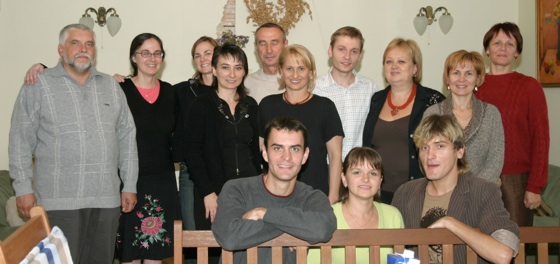
-
5.Communication is difficult in Ukraine, still, as much due to remainders of the Soviet mindset as to technological constraints. The only way to find out whether an internat would actually meet our criteria was to visit it, check out the facilities, and speak in depth with the director and staff. Our organization is primarily meant to aid orphans, and not just children in internaty, as noted in our mission statement (below). Many of the internaty we visited were well run and doing a good job, but had few orphans. These are places that we were willing to visit, assess and aid once, but not those we would help long-term.
"UCARE is a non-profit Organization whose primary focus is the children of Ukraine, primarily those living in orphanages and internaty (government run orphanage-schools). Our work aims not only to provide basic sustenance and better living circumstances for them today, but also to expand their options for a better future by providing them with health and educational opportunities. We also try to help orphanages and internaty in Ukraine not just materially and financially, but also by aiding them with staff development and teaching organizational skills." -
6.We saved on shipping costs, as we would pick items up and add them as we slowly emptied the truck. We purchased embroidery fabric in Kherson, as all the internaty wanted it. It was surprising how excited they were to get the bolts of embroidery fabric we purchased, but many of the children (boys and girls) do beautiful needlework and typically work on tiny pieces of fabric, because the fabric is expensive for them and there is no room in internat budgets for it.
We also had no trouble finding nice coloring books, although crayons do not seem to exist in Ukraine. Peggy insisted that we give each child under eleven a box of crayons and a coloring book, and the children loved them. It was amazing to see how quickly the chaos at each place quieted when the kids got their crayons and coloring books. Even the tiniest children immediately began coloring, and that was the last we heard of them!
Peggy interviews one of the scholarship students at the Kyiv office
Kyiv
